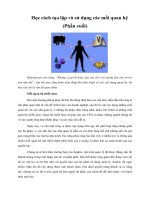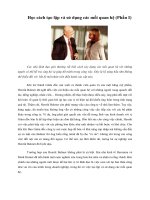English tense Cách thành lập và sử dụng các thì trong tiếng Anh
Bạn đang xem bản rút gọn của tài liệu. Xem và tải ngay bản đầy đủ của tài liệu tại đây (193.95 KB, 3 trang )
www.CareersPlay.com
Present Tense
Simple present
(Always, every…,
Never, normally,
Often, seldom,
Sometimes, usually If
Sentence type I (If i
Talk…))
Subject+1
st
Verb +Object
1
st
Verb+ s/es (He, She, It, any
Name, Singular noun)
1
st
Verb (I, We, They, You, Plural
Noun)
Eg.1. He walks.
2. She does.
3. I play.
4. You teach the lesson.
A: He speaks.
N: He does speak.
Q: Does he speak?
AAffirmative(Simple)
N Negative
Q Questions
Present Continuous
(At the moment, just, just
now, Listen! Look! ,now,
right now)
Subject +is/am/are(Helping
Verb+1
ST
Verb+ Ing+ Object
Is (He, She, It, any Name,
Singular noun)
AmI
Are(We, They, You, Plural Noun)
Eg.1. He is walking.
2. She is doing.
3. I am Playing.
4. You are teaching the lesson.
A: He is speaking.
B: He is not speaking.
C: Is he speaking?
A Affirmative
N Negative
Q Question
Present Perfect
(already, ever, just, never,
not yet, so far, till now ,up
to now)
Subject +Has/Have(Helping
Verb)+3
rd
Verb+ Object
Has(He ,She ,it ,any Name ,Singular
noun)
Have(I, We, They, You, Plural
Noun)
Eg.1. He has worked.
2. She has done.
3. I have played.
4. You have taught me the lesson.
A: He has spoken.
N: He has not spoken.
Q: Has he spoken?
A Affirmative
N Negative
Q Question
Present Perfect
Continuous
(All day, for 4 years, since
1993, how long? The
whole week)
Subject + have/has(helping
verb)+been+1
st
verb+ Ing+ Object
Has (He, She ,It ,any Name,
Singular noun)
Have (I, We, They, You, Plural
Noun)
Eg.1. He has been working.
2. She has been doing.
3. I have been playing.
4. You have been teaching.
A: He has been speaking.
N: He has not been speaking.
Q: Has he been speaking?
A: Affirmative
N: Negative
Q : Question
www.CareersPlay.com
Past Tense
Simple Past
Yesterday,2 minutes ago,
in 1990,the other day, last
Friday if sentence type II
(If talked,….))
Subject+2
nd
Verb +Object
Eg.1. He walked.
2. She did.
3. I Played.
4. You taught me the lesson.
A: He spoke.
N: He did not speak.
Q: Did he speak?
AAffirmative
N Negative
Q Question
Past Continuous
(when, while, as long as
Subject +was/were(Helping
verb)+1st Verb+ ing+ Object
Was(I, He, She, It, any Name,
Singular noun)
Were (We, They, You, Plural
Noun)
Eg.1. He was walking.
2. She was doing.
3. I was Playing.
4. You were teaching the lesson.
A: He was speaking.
N: He was not speaking.
Q: Was he speaking?
AAffirmative
N Negative
QQuestion
Past Perfect
(already, just never, not yet
Once, until that day
If sentence type
III(If I had talked,…))
Subject+ Had(Helping Verb)+3
rd
Verb+ Object
Eg.1. He had worked.
2. She had done.
3. I had Played.
4. You had taught me the lesson.
A: He had spoken.
N: He had not spoken.
Q: Had he spoken?
AAffirmative
NNegative
QQuestion
Past Perfect Continuous
(for, since, the whole day,
all day)
Subject+ had(helping
verb)+been+1
st
verb+ Ing+ Object
Eg.1. He had been working.
2. She had been doing.
3. I had been Playing.
4. You had been teaching me the
lesson.
A: He had been speaking.
N: He had not been
speaking.
Q: Had he been speaking?
AAffirmative
N Negative
QQuestion
Future Tense
Simple Future
(in a year,
next…,tomorrow
If-satz Typ I (If you
ask her, she will help
Subject +will /shall1st Verb+
Object
Eg.1. He will walk.
2. She will do.
3. I shall Play.
A: He will speak.
N: He will not speak.
Q: Will he speak?
A Affirmative
N Negative
www.CareersPlay.com
you.)
Assumption: I think,
probably, perhaps)
4. You will teach me the lesson.
Future Continuous
(in one year, next
week, tomorrow)
Subject+ will/shall(Helping
Verb)+be+1
st
Verb+ ing+ Object
Eg.1. He will be walking.
2. She will be doing.
3. I shall be Playing.
4. You will be teaching the
lesson.
A: He will be speaking.
N: He will not be
speaking.
Q: Will he be
speaking?
A Affirmative
N Negative
Q Question
Future Perfect
(by Monday, in a
week)
Subject+ will/shall(Helping
Verb)+ have +3
rd
Verb + Object
Eg.1. He will have worked.
2. She will have done.
3. I shall have Played.
4. You will have taught me the
lesson.
A: He will have
spoken.
N: He will not have
spoken.
Q: Will he be spoken.
A Affirmative
N Negative
Q Question
Future Perfect
Continuous
(for…, the last couple
of hours, all day long)
Subject+ will +have+ been+1
st
verb +ing+ Object
Eg.1. He will have been working.
2. She will have been doing.
3. I shall have been playing.
4. You will have been teaching
me the lesson.
A: He will have been
speaking.
N: He will not have
been speaking.
Q: Will he have been
speaking?
A Affirmative
N Negative
Q Question









